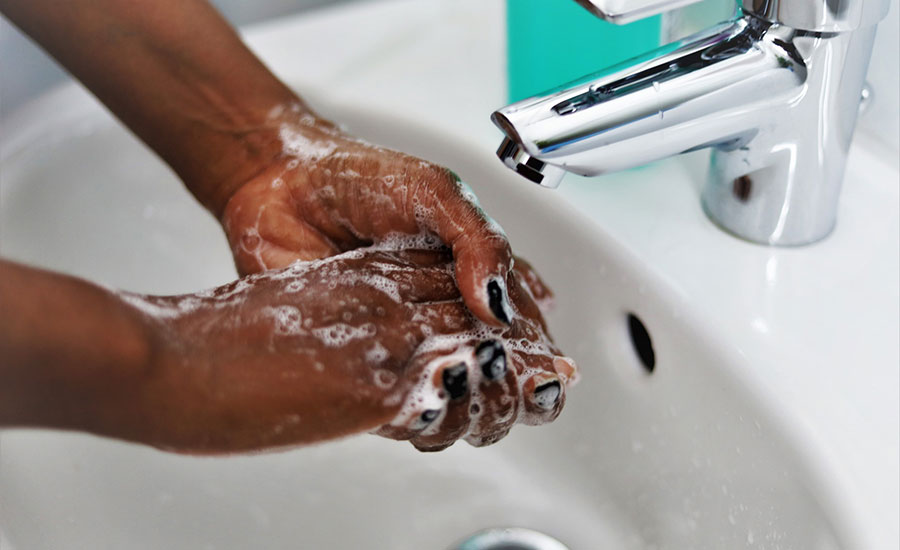Which Hygiene Practice Has Both Social And Health Benefits

Washing hands regularly promotes both health and social wellness. This simple habit reduces the spread of diseases and enhances social interactions.
Hand hygiene is essential not only for personal health but also for public well-being. The act of washing hands with soap and water can prevent the transmission of various infectious diseases, including colds, flu, and stomach infections. Ensuring hands are clean is particularly crucial before eating, after using the restroom, and when caring for the sick.
This hygiene practice not only safeguards an individual’s health but also acts as a social responsibility, as it helps to protect community health. By participating in this basic hygiene ritual, people demonstrate respect and care for others, fostering a clean and healthy environment. Thus, the simple practice of handwashing offers a dual advantage – it keeps you healthy and signals to others your commitment to collective well-being.
Identifying Key Hygiene Routines
Embracing personal hygiene is about more than just staying clean; it’s a foundational practice that promotes good health and fosters positive social interactions. From daily showers to the clothes we wear, hygiene plays a pivotal role in how we are perceived and how we feel about ourselves. Let’s delve into the key routines that can enhance both our well-being and our social lives.
Importance Of Daily Showers For Health And Social Interaction
Daily showers are fundamental for maintaining health and hygiene. They help to:
- Remove dead skin cells, bacteria, and oils.
- Prevent skin infections and reduce the risk of illness.
- Boost mental health by rejuvenating the body and mind.
- Reduce body odor, which is crucial for social acceptance and comfort.
- Enhance self-confidence, encouraging positive social interactions.
Role Of Clean Clothing In Making A Good First Impression
The impact of clean clothing on first impressions cannot be overstated. Here’s why:
| Reasons for Clean Clothing | Benefits |
|---|---|
| Creates a positive image | People associate neat attire with professionalism and reliability. |
| Signifies respect | Wearing clean clothes shows respect for oneself and others. |
| Encourages trust | Well-maintained apparel can build trust and rapport in social and professional settings. |
The right apparel choices also play a critical role in comfort and functionality, leading to better performance in day-to-day tasks.
Benefits Of Oral Hygiene
Maintaining good oral hygiene is essential not just for keeping a bright smile, but also for fostering both social connections and overall health. A consistent dental care routine can lead to significant social and health benefits, impacting various aspects of daily life. From fresh breath to the prevention of serious health issues, the importance of oral health cannot be overstated.
Connections Between Fresh Breath And Social Engagement
Fresh breath is often seen as a hallmark of good grooming and personal care. It plays a pivotal role in social situations, affecting interactions in both personal and professional contexts. Here’s why maintaining fresh breath is vital for social engagement:
- Confidence Booster: Knowing your breath is fresh can boost confidence during conversations.
- First Impressions: Meeting someone new often involves close communication where fresh breath is key.
- Relationships: Personal relationships, such as those with friends and significant others, can be strained by persistent bad breath.
Dental Health As A Window To Overall Well-being
The state of one’s dental health can often reflect their overall physical health. Oral hygiene extends beyond cavity prevention and encompasses broader health implications:
- Diseases such as diabetes, heart disease, and osteoporosis may have oral symptoms, making regular dental check-ups crucial.
- Chronic inflammation from gum disease is linked to other health issues, including an increased risk of cardiovascular diseases.
- Proper oral care reduces the risk of oral infections, which can affect the digestive and respiratory tracts.
Therefore, good oral hygiene is not only beneficial for maintaining healthy teeth and gums but could be an indicator of one’s overall health.
Handwashing: A Social Responsibility
Embracing the practice of handwashing extends beyond personal cleanliness, morphing into a vital component of community health and social etiquette. Handwashing: A Social Responsibility is not just about keeping germs at bay—it represents an act of consideration for others, showcasing a commitment to the collective well-being of society. This simple, yet profound habit sets the foundation for a healthier and more connected community.
Outbreak Prevention Through Hand Hygiene
Regular handwashing is one of the most effective measures to halt the spread of infectious diseases. It significantly reduces the likelihood of contracting illnesses such as the flu, the common cold, and gastrointestinal disorders. Community health improves substantially when individuals commit to clean hands, which in turn diminishes the strain on healthcare systems.
Example list of benefits:
- Decreases the presence of pathogens in public spaces
- Lowers the risk of cross-contamination
- Contributes to reduced healthcare costs associated with outbreaks
By diligently cleaning our hands, especially after coming into contact with high-touch surfaces or before handling food, we play an active role in preventing the proliferation of germs.
The Ripple Effect Of Clean Hands In Communities
The impact of hand hygiene transcends individual health, creating a ripple effect throughout our communities. Schools, workplaces, and public areas become safer when everyone adopts thorough handwashing practices. Clean hands contribute to a healthy environment where productivity flourishes and social connections remain intact without the lurking fear of illness.
Example table of community benefits
| Setting | Benefit |
|---|---|
| Schools | Reduced absenteeism due to sickness |
| Workplaces | Enhanced employee health and productivity |
| Hospitals | Lowered rates of healthcare-associated infections |
Educating young children about the importance of handwashing paves the way for lifelong habits, ensuring the next generation continues to uphold this essential practice. Public campaigns and workplace policies further reinforce the message, emphasizing that while handwashing is a personal act, it carries significant societal ramifications.
Hair And Nail Care Significance
Maintaining good hair and nail hygiene extends beyond personal grooming; it embodies a practice with both vast social and health advantages. The state of a person’s hair and nails can speak volumes about their overall well-being and can have a significant impact on their psychological state as well as the perception others may have. Caring for these aspects not only promotes physical health by preventing issues but also bolsters confidence and professional impressions.
The Psychological Impact Of Well-groomed Hair
Impressions formed within the first few seconds of meeting someone can be long-lasting. A head of well-groomed hair often equates to a person being viewed as organized and attentive to detail. The act of caring for one’s hair not only improves one’s appearance but also has therapeutic effects. Studies have shown that the routine of hair care can be calming and have the following benefits:
- Boosts Self-Esteem
- Enhances Mood
- Decreases Stress Levels
Clean, shiny, and healthy-looking hair can thus positively affect one’s social interactions and self-image.
Nail Cleanliness And Its Perception In Professional Settings
In professional environments, clean and well-maintained nails are often considered a reflection of a person’s level of professionalism. Neglecting nail care can lead to negative judgments and missed opportunities. The following table highlights key aspects of nail hygiene and their perceived traits in professional contexts:
| Nail Trait | Perceived Professional Trait |
|---|---|
| Clean | Hygienic |
| Trimmed | Orderly |
| Healthy | Diligent |
Regular nail care not only prevents infections but also strengthens professional relationships by exuding an aura of meticulousness and credibility. Prioritizing nail hygiene can create a polished impression that has the power to sway professional opinions in one’s favor.
Body Odor Management Practices
Managing body odor is a crucial hygiene practice that serves dual purposes: fostering good health and enhancing social interactions. Effective body odor management not only mitigates the risks of bacterial growth on the skin but also ensures that interactions with others remain pleasant and confidence remains high. Let’s dive into some essential practices and products that can help keep body odor in check.
Daily Practices To Reduce Body Odor
Maintaining a daily hygiene routine is vital for body odor control. Here are several steps to incorporate:
- Bathe regularly to wash away sweat and bacteria.
- Use antibacterial soap in areas prone to odor.
- Wear breathable fabrics like cotton to reduce sweat.
- Keep underarms shaved or trimmed to decrease bacteria habitat.
- Stay hydrated to help flush out toxins from the body.
Choosing The Right Deodorants For Health And Social Confidence
Selecting a deodorant is a personal choice but it’s important to find one that aligns with health standards and social confidence.
| Feature | Benefit |
|---|---|
| Aluminum-free | Reduces potential skin irritation and health concerns. |
| Long-lasting | Ensures freshness throughout the day, boosting confidence. |
| Natural ingredients | Minimizes the risk of allergic reactions and supports skin health. |
| Scents that suit your style | Enhances personal branding and social appeal. |
Experiment with different products to discover the best fit for your body chemistry and lifestyle. Remember to also consider the product’s environmental footprint, as sustainable choices reflect responsible personal hygiene practices.

Frequently Asked Questions For Which Hygiene Practice Has Both Social And Health Benefits
How Does Handwashing Benefit Overall Health?
Handwashing regularly with soap removes germs and prevents illness. It’s effective against spreading infections and maintaining personal cleanliness, benefitting both individual and community health.
What Social Advantages Stem From Good Dental Hygiene?
Good dental hygiene reduces the risk of bad breath, promoting better social interactions. It also enhances confidence during communication, fostering stronger personal and professional relationships.
Can Proper Hygiene Affect Mental Well-being?
Yes, maintaining personal hygiene has positive effects on mental health. It boosts self-esteem, reduces anxiety related to social acceptance, and promotes a sense of well-being.
Why Is Showering Important For Social Health?
Showering regularly helps to control body odors, making social situations more comfortable. It presents a clean and groomed appearance which is widely appreciated in social settings.
Conclusion
Adopting good hygiene impacts our lives positively. It bridges health with social interaction seamlessly. Regular handwashing, for one, curbs disease spread and eases social engagement. Embracing such practices enriches our well-being. Let’s commit to hygiene rituals that foster healthier communities.

Emma combines her teaching experience with her writing skills to produce engaging and informative content. She covers a range of topics, from classroom management to innovative teaching techniques.






